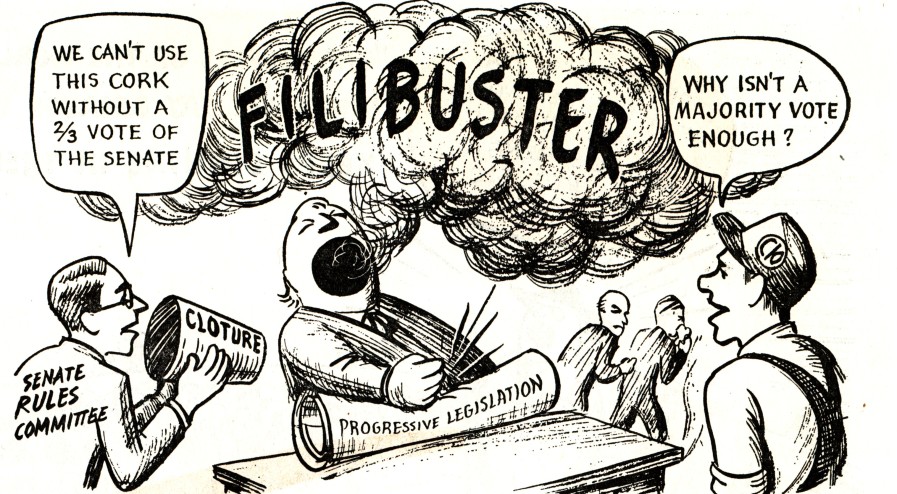 |
| ▲ Filibuster in Assembly in Comics 1 |
Up until a few days ago, the Antiterrorism Law faced stiff opposition in the National Assembly. President Park Geun-hye tried to establish the Antiterrorism Law, which expanded the powers of the National Intelligence Service (NIS) and imposed serious restrictions on the civil liberties of our citizens. The president’s ruling party holds a majority in congress and used their significant representation to push the bill forward, despite the opposition. In response to the government’s plan to push the bill forward, opposition party members launched a 192-hour long voting delay by filibustering during the debate of the proposed legislation. Essentially the opposition party members addressed their concerns about the bill through a non-stop 24 hour a day discussion, which took place in the National Assembly from February 23 to March 2.
So why did President Park Geun-hye introduce the Antiterrorism Law? In 2015, the Islamic State (IS) was making headlines around the world terrorizing powerful western countries, such as France, USA, Turkey, etc and more recently Belgium. In addition, 4 young Koreans were caught engaging in contact with IS. For these reasons, many countries, including Korea, felt their safety was being threatened. Furthermore, North Korea’s renewed aggressive attitude towards our country led the government to believe the time for an antiterrorism law was overdue. So the ruling party tabled the Antiterrorism Law. At the time, the opposition party agreed to it. However, the ruling party’s stance was that the NIS was to take the lead on terrorism, but the opposition party argued the NIS had lost the trust of the nation because of its well-known intervention in the presidential election, its hacking program and the fact that it spied against ordinary citizens. The opposition argued instead that terrorism is a national danger, so the Ministry of Public Safety and Security should be in charge. However, the government suggested that the focus of the Ministry of Public Safety is to prevent accidents and disasters, not acts of terror. With no compromise in sight, the difference of opinion was seemingly never going to be resolved.
In the end, their opinions didn’t come any closer to an agreement, and President Park Geun-hye announced the passing of the Antiterrorism Law in a public statement after a vote by the assembly. The president was able to pass the bill as her ruling party has a majority of elected members in the National Assembly. The only tool the opposition party had was to filibuster the debate, hoping to raise the ire of public scrutiny. This was the first time this tactic was used after a 52-year hiatus.
Filibustering is a parliamentary procedure where debate over a proposed piece of legislation takes place for an unusually long period of time, allowing one or more members of the National Assembly to delay or prevent a vote on the proposed law altogether. It is also known as “talking out a bill” or “talking a bill to death”. The United States hold the longest record for filibustering when Senator Storm Thurmond spoke on a bill for 24 hours and 8 minutes in 1957.
In Korea, we have seen this type of voting delay only twice in our history. The last time was in 1964, when then President Kim Dae-jung filibustered a proposed law.
Filibustering finds its origins in ancient Rome when Marcus Porcius Cato, a Roman politician, soldier, and philosopher first used this method to delay the adoption of a bill. He spoke on it long into the night. At the time, according the rules of the ancient Roman senate, all tabled laws had to be addressed before sunset, so this was a very good tactic to prevent the adoption of a bill. Essentially Cato halted Caesar’s attempt to seize power over Rome using this method.
Korea’s recent filibuster took place between February 23 and March 2 and lasted for 192 hours. Many politicians rose to fame as a result of their participation in this debate including the longest speaker, who covered 12 hours of the debate, and the speaker who gave hope to the nation’s youth.
 |
| ▲ Filibuster in Assembly in Comics 2 |
The Dankook Herald (DKH) interviewed Eun Su-mi, a national assemblywoman and candidate for Seongnam-si in this upcoming election. She participated in the filibuster for 10 hours and 18 minutes on February 24. She became famous for her actions as she skipped meals and postponed bathroom duties to accomplish this task and suffered from poor health as a result.
First, she talked about the effects of the filibuster. She explained that even though the debate lasted 192 hours and failed to stop the passing of the terror prevention law, it was successful in evoking the interests of ordinary citizens. “During this filibuster we were able to talk about the law itself rather than whether it would pass or not, and by showing the process to the people we were able to help form public opinion,” she said.
The DKH wondered if the decision to filibuster shared any close correlations with the looming general election. According to one social media big data analysis service, the interest of the public rose as the filibuster ended and the general election nears. Therefore, we asked her opinion on the correlation between the decision to filibuster and the general election.
She said, “I think many people showed interest in the filibustering and felt happiness, anger and regret along with the members of the assembly. Since this led to individual attention being focused on the participating assemblymen, it will of course have an indirect influence on increasing the public support for the candidates in their regional elections.”
“However, we do not believe that filibuster alone can totally change the outcome of an election. Rather than priding themselves on the people’s support and interest, it is more appropriate that opposition lawmakers create policies that correspond with public demand which would then lead to them being elected,” she said regarding her thoughts on the election.
Assemblywoman Eun also pointed out that she saw the significance of communication through the filibustering process. She hopes that in future the National Assembly can be viewed as a responsible place for dialogue and communication and that the upcoming 20th National Assembly will be the start of politics of trust between the elected and opposition parties through enthusiastic debates like this filibuster.
With the April 13 general election just around the corner, the filibustering debate was suspended in order to deal with the final draft of the constituencies. Therefore, the terror prevention law was inevitably passed by the government majority in the National Assembly.
There is less than a month left until the general election for the representatives of the National Assembly. We will be able to see then, with our own eyes, whether the month-old filibuster had any influence on the number of seats for the elected and opposition parties.
이다혜, 오수연 dankookherald@gmail.com

![[Campus Magnifier] Let's Surf the Library!](/news/photo/202404/12496_1765_4143.jpg) [Campus Magnifier] Let's Surf the Library!
[Campus Magnifier] Let's Surf the Library!
![[Campus Magnifier] Let's Surf the Library!](/news/thumbnail/202404/12496_1765_4143_v150.jpg)





